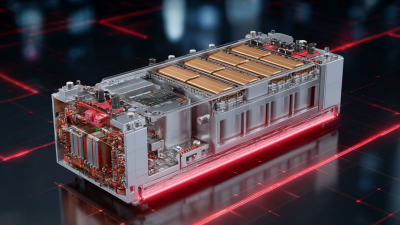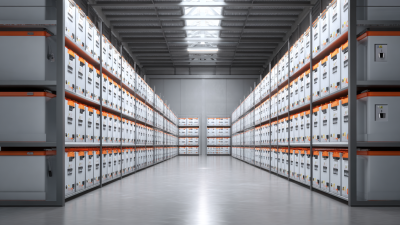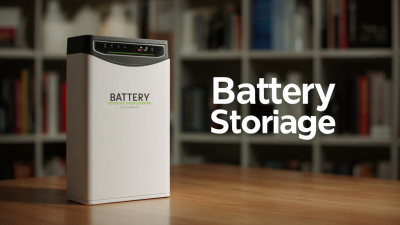Exploring Alternative Technologies for Lithium Marine Batteries
As the maritime industry continues to seek sustainable energy solutions, the exploration of alternative technologies for Lithium Marine Batteries has gained significant traction. According to a report by Fortune Business Insights, the global marine battery market is expected to grow from $1.67 billion in 2021 to $4.28 billion by 2028, driven by the demand for eco-friendly energy sources and advancements in battery technology.

Lithium Marine Batteries, known for their high energy density and longevity, have been at the forefront of this revolution; however, the environmental concerns surrounding lithium extraction and supply chain instability have prompted researchers and manufacturers to look for viable alternatives. This blog delves into the emerging technologies that could potentially reshape the future of marine energy storage and tackle the challenges posed by traditional lithium-based systems.
Alternative Battery Technologies: An Overview of Options Beyond Lithium
As the maritime industry seeks more sustainable energy solutions, exploring alternative battery technologies beyond lithium is crucial. While lithium-ion batteries have been dominant due to their energy density and efficiency, they present challenges such as resource scarcity and environmental concerns. Innovations in battery technologies such as sodium-sulfur, flow batteries, and solid-state batteries promise to mitigate these issues.
Sodium-sulfur batteries, for example, are known for their high energy density and relatively abundant resources. These could be a game-changer for marine applications where weight and space are at a premium. Flow batteries, on the other hand, offer scalability and longevity, making them suitable for larger vessels that require sustained energy management over extended periods. Solid-state batteries present another exciting avenue, providing enhanced safety and higher energy densities through advanced materials.
**Tip:** When considering the adoption of alternative battery technologies, assess the specific energy needs and operational conditions of your vessel. Effective energy management strategies, including the potential integration of hybrid systems that combine different battery types, can optimize performance and sustainability on the water. Also, keep an eye on ongoing research and developments in the battery sector that could bring further innovations to marine applications.
Exploring Alternative Technologies for Lithium Marine Batteries
This bar chart illustrates the energy density (Wh/kg) and cycle life of various alternative battery technologies compared to traditional lithium-ion batteries, providing an overview of options available for marine applications.
Understanding the Environmental Impact of Lithium vs. Alternative Marine Batteries
As the demand for marine batteries increases, the environmental impact of lithium batteries raises significant concerns. While lithium-ion batteries have been the go-to solution for many marine applications due to their high energy density and efficiency, their production and disposal pose environmental risks. The extraction process of lithium often leads to habitat destruction, water depletion, and pollution. Understanding these environmental implications is crucial for making informed choices about marine power sources.
Alternative technologies, such as sodium-ion and solid-state batteries, are emerging as promising substitutes for lithium. Sodium-ion batteries utilize more abundant materials and may offer a lower carbon footprint during production. Solid-state batteries also present the potential for improved safety and longevity, which could offset some of the environmental costs associated with conventional lithium batteries.
**Tips for Sustainable Battery Choices:**
1. **Research Battery Lifespan**: Evaluate not only the upfront costs but also the lifespan and recyclability of various battery technologies. Longer-lasting batteries reduce the frequency of replacements, minimizing waste.
2. **Check for Certifications**: Look for environmentally friendly certifications that indicate responsible sourcing and lower environmental impact during manufacturing.
3. **Consider Hybrid Solutions**: Explore hybrid battery systems that can leverage the strengths of different technologies while reducing reliance on lithium-based solutions.

Performance Comparisons: Lithium Batteries vs. Emerging Technologies
As interest in marine battery technologies grows, the performance comparisons between lithium batteries and emerging alternatives become crucial for the industry. Traditional lithium-ion batteries have dominated due to their high energy density and established infrastructure. However, new entrants such as biochar-based systems and mechanically rechargeable zinc-air batteries are showing promise, particularly in niche applications where sustainability and efficiency are prioritized. These technologies can potentially minimize the environmental impact associated with lithium extraction and processing, a persistent challenge in the current landscape.
Moreover, advancements in solid-state technologies and supercapacitors provide intriguing parallels to lithium batteries. Solid-state batteries, utilizing lithium fluoride among other materials, promise improved safety and energy density, while supercapacitors excel in rapid charging and longevity. The interplay between these technologies emphasizes the need for continuous innovation to meet the diverse demands of marine applications. As manufacturers and researchers delve deeper, the marine sector stands to benefit significantly from these developments, enhancing everything from operational efficiency to ecological sustainability.
Exploring Alternative Technologies for Lithium Marine Batteries - Performance Comparisons: Lithium Batteries vs. Emerging Technologies
| Battery Type | Energy Density (Wh/kg) | Cycle Life (Cycles) | Charge Time (Hours) | Cost ($/kWh) |
|---|---|---|---|---|
| Lithium-ion | 150 | 2000 | 1 | 300 |
| Sodium-ion | 100 | 3000 | 2 | 250 |
| Solid-state | 200 | 5000 | 0.5 | 500 |
| Flow battery | 40 | 10000 | 6 | 400 |
| Supercapacitor | 5 | 100000 | 0.1 | 150 |
Cost Considerations: Analyzing the Economics of Alternative Marine Batteries
As the demand for sustainable energy solutions in marine applications grows, the economics of alternative battery technologies are coming under scrutiny. Traditional lithium-ion batteries, while popular, often face high costs, particularly when it comes to sourcing raw materials like lithium and cobalt. According to a recent report by Allied Market Research, the global marine battery market is projected to reach $16.2 billion by 2027, prompting the exploration of more cost-effective alternatives, such as sodium-ion and solid-state batteries.
Sodium-ion batteries present a promising solution due to their abundance and lower extraction costs. Research indicates that sodium-ion technology can lead to a reduction in battery pack costs by approximately 30% compared to lithium-ion systems, largely due to the significantly lower cost of sodium compared to lithium. Furthermore, a study from McKinsey & Company highlights that investments in new battery technologies could yield a return on investment for marine operators, potentially achieving payback periods of less than five years.
Solid-state batteries also hold significant potential; they offer higher energy densities and improved safety profiles. While current production costs are high, advancements in manufacturing processes could reduce costs by as much as 20% within the next decade, as indicated by projections from the International Energy Agency. As marine industries increasingly factor in lifecycle costs and environmental impacts, the focus on these alternatives will likely reshape the economic landscape of marine power systems.

Future Trends: What’s Next for Marine Battery Technology Beyond Lithium?
The marine battery technology landscape is evolving rapidly, pushing the boundaries of traditional lithium-ion solutions. As environmental concerns and the quest for sustainable energy sources intensify, researchers and engineers are exploring alternative technologies that could redefine energy storage and usage in marine applications. Beyond lithium, materials such as sodium-ion, flow batteries, and solid-state batteries are gaining traction due to their potential for higher energy densities, safer operation, and lower environmental impact.
Sodium-ion batteries, for instance, offer a promising alternative thanks to the abundance and affordability of sodium compared to lithium. This technology could greatly reduce energy costs for marine operators while enhancing performance in diverse conditions. Meanwhile, flow batteries, known for their scalability and longevity, have caught the interest of those looking for reliable solutions for larger vessels or longer journeys. Additionally, solid-state batteries promise higher safety profiles due to their non-flammable electrolytes and greater efficiency. As these technologies develop, they present a significant opportunity to make marine travel more sustainable, paving the way for greener alternatives in the maritime industry.
Related Posts
-

Unlocking the Future: Advantages of the Best Energy Storage LiFePO4 Battery for Global Buyers
-

Essential Power Storage Battery Maintenance Checklist for Optimal Performance
-

How to Choose the Best Energy Storage Battery for Your Business Needs
-

The Ultimate Guide to Maximizing Efficiency with Energy Storage Batteries: Key Trends and Innovations
-

How to Choose Best Battery Storage Solutions According to Industry Manufacturing Standards
-

Future of Solar Battery Market by 2025 and How to Choose the Best Option for Your Needs
